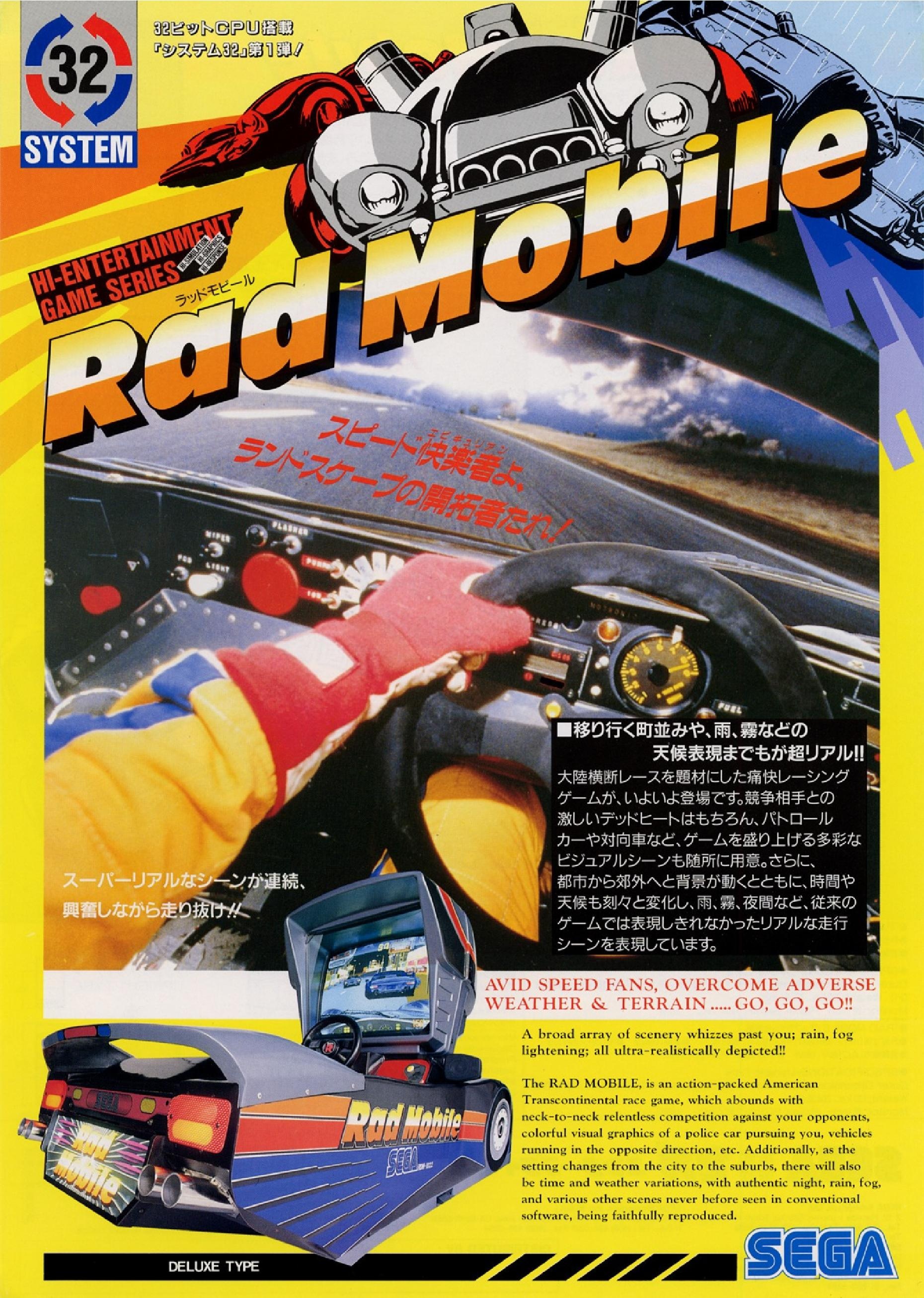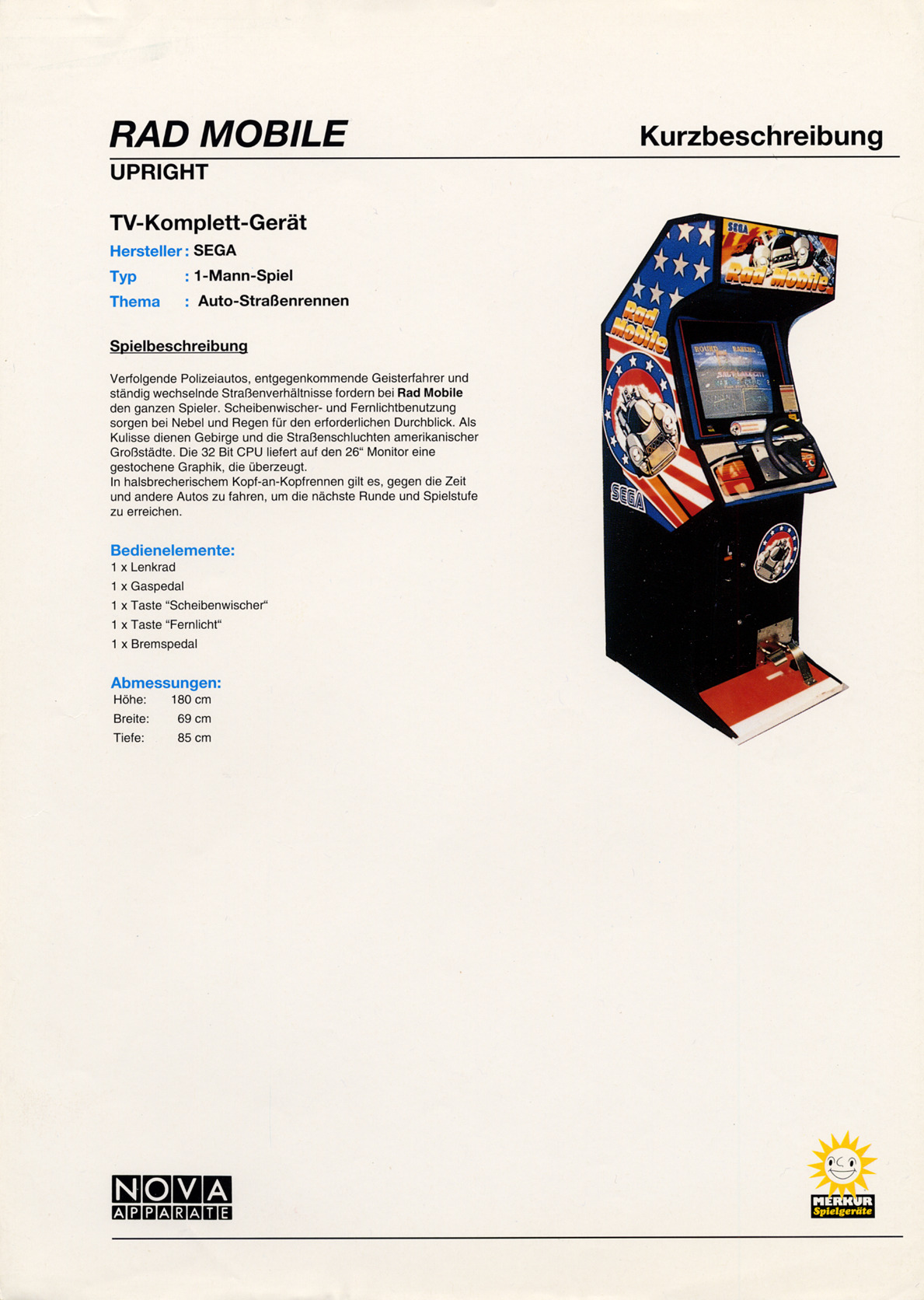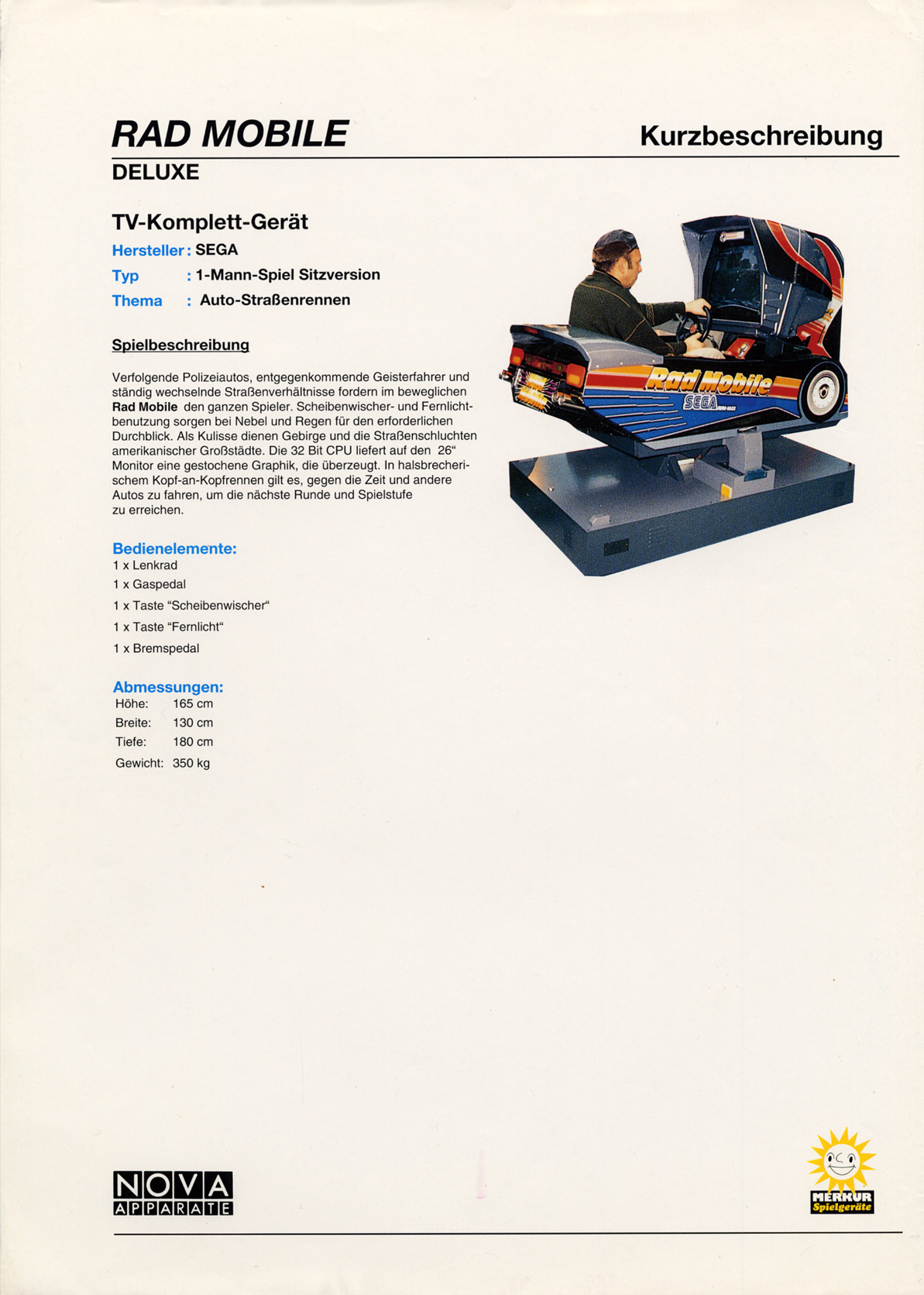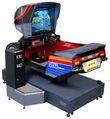Rad Mobile
From Sega Retro
| Rad Mobile | |||||||||||||||||||||||||||||||||
|---|---|---|---|---|---|---|---|---|---|---|---|---|---|---|---|---|---|---|---|---|---|---|---|---|---|---|---|---|---|---|---|---|---|
| System(s): Sega System 32 | |||||||||||||||||||||||||||||||||
| Publisher: Sega Enterprises, Ltd. | |||||||||||||||||||||||||||||||||
| Developer: Sega R&D 1[1] (early), Sega AM3[2] (final) | |||||||||||||||||||||||||||||||||
| Genre: Racing | |||||||||||||||||||||||||||||||||
| Number of players: 1-2 | |||||||||||||||||||||||||||||||||
|
This short article is in need of work. You can help Sega Retro by adding to it.
Rad Mobile (ラッドモビール) is a Sega System 32 arcade driving game developed by Sega AM3 and manufactured by Sega Enterprises, Ltd. First released to arcades in late 1990, the game is notable for being the first 32-bit title developed by Sega, and for featuring the first inclusion of Sonic the Hedgehog in any video game (even predating his own, Sonic the Hedgehog, released four months later.)
The game would later receive an expanded port to the Sega Saturn as Gale Racer.
Contents
Gameplay
Rad Mobile deviates slightly from the style of Sega's previous arcade racers; it aims to provide more elements of simulation, using a first-person perspective instead of third. Recurring traffic, police, and primitive weather effects act as obstacles, the latter of which are negated with the use of in-game windscreen wipers and headlights. 14 CPU cars also race as opponents, with players receiving different ending scenarios depending on their rank at the end of the game.
Regardless of its sim-like features, a time limit and only two selectable gears are still used in Rad Mobile, grounding it in the arcade subgenre of racing games. Like OutRun, stages take place across the USA, with the goal being to reach the final destination, New York, before the time limit runs out. This is achieved by avoiding collisions with oncoming obstacles and reaching stage checkpoints, which provide time extensions.
Stages
- Stage 1: Los Angeles - Day
- Stage 2: Mojave Desert - Day
- Stage 3: Las Vegas - Night
- Stage 4: Provo - Rain
- Stage 5: Salt Lake City - Day
- Stage 6: Rocky Mountains - Day
- Stage 7: Cheyenne -Thunder Storm
- Stage 8: Lincoln - Night
- Stage 9: Omaha - Day
- Stage 10: Kansas City - Fog
- Stage 11: St. Louis - Night
- Stage 12: Springfield - Rain
- Stage 13: Chicago - Day
- Stage 14: Indianapolis - Night
- Stage 15: Cincinnati - Day
- Stage 16: Columbus - Dusk
- Stage 17: Pittsburgh - Night
- Stage 18: Washington, D.C. - Fog
- Stage 19: Philadelphia - Day
- Stage 20: New York - Day
Some stages, such as Springfield, have multiple routes.
History
Development
The game was born out of necessity, as a sample racing game for the Sega System 32 board, and the lead programmer behind the board, Yu Suzuki, went on to develop the eventual game[9].
Release
Initially released to the world in the upright and Taikan cabinets typical of a release of its type by that point in February 1991, Rad Mobile would receive two new versions in the following months; Rad Rally, a revised edition that implements stage selection and multiplayer link features, and a limited release for adapted R360 units in Japan.
Rad Mobile features the first appearance Sonic the Hedgehog in any video game (even predating his own, released four months later), swaying from the car's rear-view mirror as a miniature plush. The game's later Sega Saturn port Gale Racer expands this cameo to a number of Sonic-series characters such as Amy and Dr. Eggman.
Legacy
Rad Mobile was later updated and released as Gale Racer for the Sega Saturn in December 1994. This version makes a few changes, and was not released outside of Japan.
"Soup Up", the first piece of background music in the game, was arranged for play by the S.S.T. Band, debuting alongside the soundtrack's first publishing in Formula, and would again be arranged by original composer Kazuhiko Nagai for Rad Mobile Original Soundtrack and Koichi Namiki for Astro City Mini: Celebration Album. The song also plays when inputting the name "R.M" in the high score table of Daytona USA.
Production credits
- Main article: Rad Mobile/Production credits.
Magazine articles
- Main article: Rad Mobile/Magazine articles.
Promotional material
Photo gallery
AOU Show 1991, R360 version
Physical scans
| Sega Retro Average | ||||||||||||||
|---|---|---|---|---|---|---|---|---|---|---|---|---|---|---|
|
| 83 | |
|---|---|
| Based on 2 reviews | |
| System 32, US (upright) | ||||
|---|---|---|---|---|
| System 32, US (deluxe) | ||||
|---|---|---|---|---|
| System 32, JP (upright) | ||||
|---|---|---|---|---|
| System 32, JP (deluxe) | ||||
|---|---|---|---|---|
| System 32, DE (upright) | ||||
|---|---|---|---|---|
| System 32, DE (deluxe) | ||||
|---|---|---|---|---|
References
- ↑ http://www.hitmaker.co.jp/top/lounge/corumun/site/corumun_txt22.html (Wayback Machine: 2003-04-22 21:39)
- ↑ The Cutting Room Floor: Rad Mobile
- ↑ 3.0 3.1 3.2 3.3 3.4 Game Machine, "1991-03-01" (JP; 1991-03-01), page 16
- ↑ Rad Mobile (Registration Number PA0000606075), United States Copyright Office
- ↑ File:GameMachine JP 388.pdf, page 12
- ↑ Sega Arcade History, Enterbrain, page 105
- ↑ https://archive.org/details/ArcadeGameList1971-2005/page/n133/mode/1up
- ↑ File:RadMobile System32 JP Flyer.pdf, page 2
- ↑ https://youtu.be/cMYVwNRxatk?si=fdypg0ejWOaqnsZF
- ↑ Sinclair User, "March 1991" (UK; 1991-02-18), page 54
- ↑ User, "Septémvrios 1992" (GR; 1992-0x-xx), page 93
| Rad Mobile | |
|---|---|
|
Main page | Comparisons | Credits | Development | Magazine articles | Reception
| |












